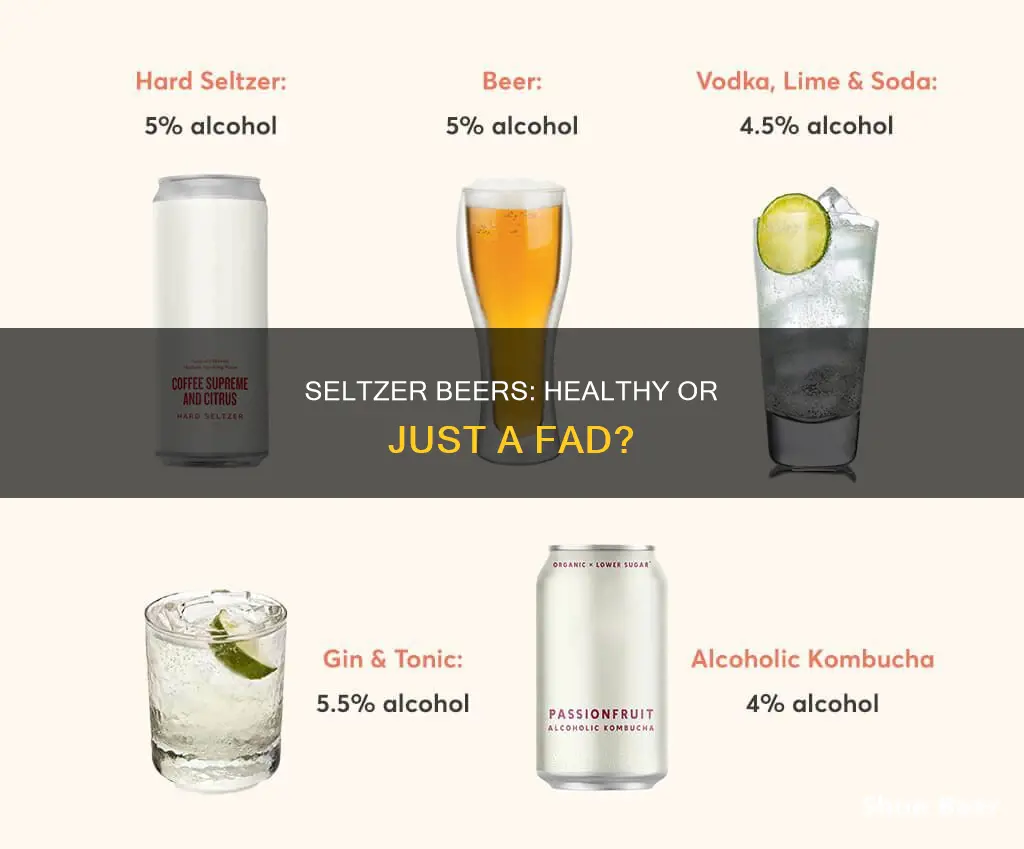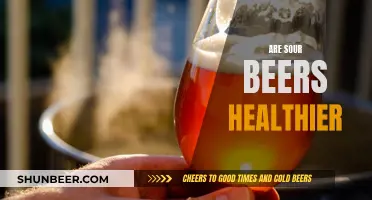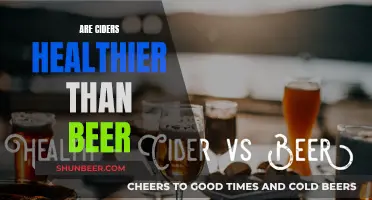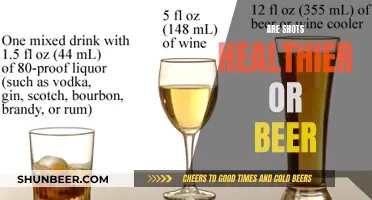
With their light, fruity flavours, hard seltzers have become a popular alternative to beer. But are they actually healthy? Hard seltzers tend to have fewer calories than beer due to their lack of carbohydrates, and they're also usually gluten-free. However, they're still alcoholic drinks, so they're not exactly healthy. In fact, because they're easy to drink, you might end up consuming more alcohol than you realise, which could have negative health consequences. So, while hard seltzers might be a better option than beer in some ways, it's important to consume them in moderation.
| Characteristics | Values |
|---|---|
| Calories | Hard seltzers have fewer calories than beers, but this is not always the case. |
| Carbohydrates | Hard seltzers have fewer carbohydrates than beers. |
| Gluten | Hard seltzers are gluten-free, whereas beers are not. |
| Alcohol Content | Hard seltzers and beers have a similar alcohol content of around 5% ABV. |
| Taste | Hard seltzers have a lighter taste than beers, which can make it easier to drink more. |
| Health | Neither hard seltzers nor beers are inherently healthy due to their alcoholic content. |

Calories and carbohydrates
A typical 12-ounce can of hard seltzer contains about 100 calories and 2 grams of carbohydrates, while a similar-sized beer can have up to 150 calories and 15-30 grams of carbohydrates. This difference in calorie and carb content is mainly due to the use of fermented cane sugar in hard seltzers, which also makes them gluten-free.
However, it is important to note that the low-calorie and low-carb content of hard seltzers might lead people to consume more than they would with regular beer. This is known as the "health halo" effect, where people assume that a product is healthy and, therefore, overconsume it. Additionally, the refreshing and light nature of hard seltzers makes it easier to drink multiple servings without feeling full or satisfied, as one might with beer.
When comparing hard seltzers to light beers, the calorie difference becomes less significant. Light beers typically have around 100 calories for a 12-ounce can, which is comparable to hard seltzers. However, hard seltzers still tend to have a lower carbohydrate content, with light beers containing about 5.3 grams of carbs per serving.
In conclusion, while hard seltzers generally have lower calories and carbohydrates than regular beers, it is important to consider the potential impact of the "health halo" effect and the refreshing nature of these drinks, which may lead to overconsumption. As with any alcoholic beverage, moderation is key to maintaining a healthy relationship with hard seltzers and beers.
Moscow Mule vs Beer: Which Cocktail is Healthier?
You may want to see also

Gluten content
Gluten is a protein found in most wheat products, and acts as the “glue” that helps to hold wheat, barley, kamut, spelt, farro, durum, bulgur, rye, and semolina together. Gluten is naturally occurring, and therefore is impossible to strip away from the grain. If a grain naturally has gluten in it, there’s no way to make that food gluten-free.
Most hard seltzers are made using cane sugar to create the alcohol, and this process makes them gluten-free. However, some hard seltzers are made using gluten-containing grains, such as malted barley or barley malt. Sometimes the gluten is left in the drink, and sometimes it is removed after the fermenting process, otherwise known as "gluten removed".
Gluten-removed means that during the crafting process, the manufacturers were able to remove some but not all of the gluten, making it less than 20ppm present in the product. These gluten-removed products wouldn’t be considered 100% gluten-free as you’d find in a naturally gluten-free product.
If you are looking for a gluten-free hard seltzer, there are a number of brands that offer this, including:
- White Claw
- High Noon Sun Sips
- Truly
- Vizzy
- Bon & Viv Spiked Seltzer
- Michelob Ultra Organic Seltzer
- Wild Basin Hard Seltzer
- Willie’s Superbrew
However, if you have coeliac disease, it is recommended to choose gluten-free seltzers, rather than gluten-removed options. Some gluten-free options include:
- Spiked pineapple pomelo seltzer
- Spiked ruby red grapefruit seltzer
- Spiked raspberry lime seltzer
- Spiked black cherry seltzer
- Bodega Bay Hard Seltzer
- Bon & Viv Spiked Seltzer
- Black Cherry Rosemary
- Blackberry Hard Lemonade Seltzer
- Original Hard Lemonade Seltzer
- Strawberry Hard Lemonade Seltzer
- Michelob ULTRA Organic Seltzers
- Truly
- White Claw
Happy Dads, Healthy Beer: A Cheerful Toast
You may want to see also

Alcohol content
In comparison, light beers usually have an alcohol content of around 4.2%, while regular beers are often 5%, and craft beers can reach 6.5% ABV. Hard seltzers generally have a lower alcohol content than wine, which typically ranges from 10% to 15% ABV, depending on the type. When it comes to liquor, a single shot of spirits like vodka, gin, or whiskey is typically 40% ABV.
While hard seltzers may have a lower alcohol content than some beers and cocktails, it's important to remember that alcohol is alcohol. Excessive alcohol consumption, regardless of the type, is linked to various health risks, including high blood sugar, heart disease, stroke, digestive problems, liver disease, and cancer. Therefore, it's crucial to consume alcoholic beverages in moderation, regardless of their alcohol content.
The low alcohol content of hard seltzers, along with their refreshing and light nature, can make it easier to overconsume. This is further exacerbated by the fact that hard seltzers are often marketed as a "healthy" alternative to other alcoholic beverages. However, it's important to remember that hard seltzers, like any other alcoholic drink, contain empty calories and provide no nutritional value.
Amber Beers: Health Benefits or Just a Myth?
You may want to see also

Health halo effect
The "health halo" effect is a common phenomenon in nutrition and wellness, where consumers automatically assume a product is healthy based on limited information or marketing claims. This effect is particularly relevant when discussing the popularity of seltzer beers, which are often perceived as a healthier alternative to regular beer.
Seltzer beers, also known as hard seltzers, have experienced a surge in popularity due to their light and refreshing nature. They are typically made with brewed cane sugar and/or malted rice, with added soda water and flavourings, resulting in a drink that is lower in calories and carbohydrates than most beers and cocktails. This has led many consumers to view them as a healthier option.
However, the health halo effect comes into play when consumers assume that seltzer beers are inherently healthier due to their lower calorie and carb content. This assumption can lead to overconsumption, as individuals may feel justified in drinking more because of the perceived health benefits. Additionally, the light and refreshing nature of seltzer beers makes it easier to drink multiple servings without feeling full, as one might with regular beer.
It is important to remember that alcohol is alcohol, regardless of its source. Excessive alcohol consumption is linked to various long-term health risks, including high blood sugar, heart disease, stroke, digestive problems, liver disease, and cancer. Therefore, while seltzer beers may have some nutritional advantages over regular beer, they should still be consumed in moderation.
The health halo effect is not limited to the alcohol industry but is prevalent in food marketing as well. Claims such as "low-fat", "gluten-free", or "organic" can lead consumers to assume that a product is healthy overall, even if it is high in sugar or lacking in nutritional value. As a result, individuals may overeat or make unhealthy choices, believing they are making a healthier decision.
To make informed choices, consumers should look beyond marketing claims and pay close attention to nutritional information and serving sizes. Understanding the health halo effect can help individuals make more balanced decisions about their food and drink choices, ensuring they lead healthier lifestyles.
Hard Liquor vs Beer: Which is the Healthier Choice?
You may want to see also

Hydration
Seltzer is a popular drink, with Americans consuming 170 million gallons of it annually as of 2017. But is it a good choice for hydration?
Seltzer is made by adding carbon dioxide under pressure to plain water, creating a bubbly effect. While it may not feel as hydrating as regular water due to its texture, it is just as hydrating. According to Jessica Crandall Snyder, a registered dietitian nutritionist, "science shows seltzer water is just as hydrating as regular tap water. It doesn't dehydrate you." This means that drinking seltzer can help you meet your daily water intake goals. The Institute of Medicine recommends that men drink at least 101 ounces of water per day, while women should aim for at least 74 ounces. However, these recommendations may vary depending on factors such as activity level, climate, and exercise.
It's important to note that plain, carbonated water is the best choice for hydration. Additives such as acids, sugar, and sodium in flavoured seltzers may negatively impact your health. Additionally, consuming large amounts of carbonated water can cause bloating and other stomach discomforts.
When it comes to alcoholic seltzers, they are not a good choice for hydration. Like other alcoholic beverages, they cause you to lose water by increasing urination. So, if you're drinking alcoholic seltzers, be sure to drink plenty of water to stay hydrated.
Soda vs Beer: Which Drink is Healthier?
You may want to see also
Frequently asked questions
While seltzer beers have fewer calories and carbohydrates than most beers, they are not necessarily healthy. The lower calorie count in seltzers may encourage people to drink more, which can lead to excessive alcohol consumption and its associated health risks.
Excessive alcohol consumption is linked to various long-term health conditions, including high blood sugar, heart disease, stroke, digestive problems, liver disease, and cancer.
A typical 12-ounce can of seltzer beer contains about 100 calories, which is lower than most beers, wines, and cocktails. However, clear liquors like vodka and tequila are also low-calorie options when mixed with zero-calorie soda water.
Seltzer beers are generally gluten-free, making them a suitable option for individuals with gluten intolerance or celiac disease. They also tend to have a lower alcohol content than mixed drinks, making them less likely to cause a hangover.
Yes, seltzer beers can be a good option if you're trying to reduce your calorie intake. However, it's important to remember that alcohol itself is empty calories, and drinking in moderation is crucial.







